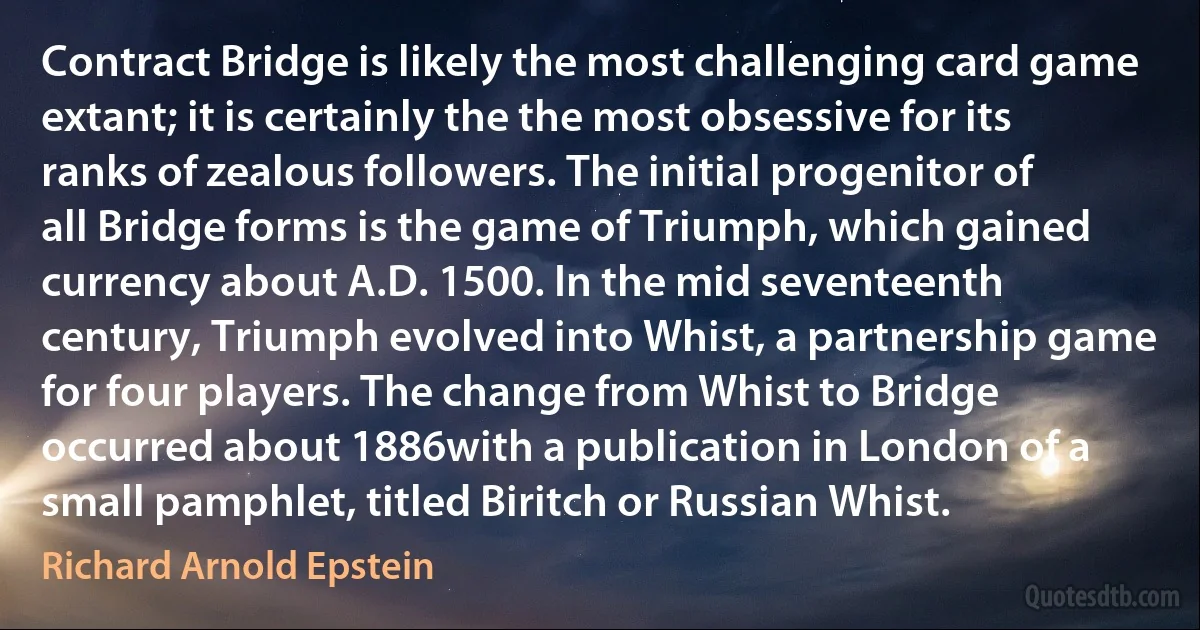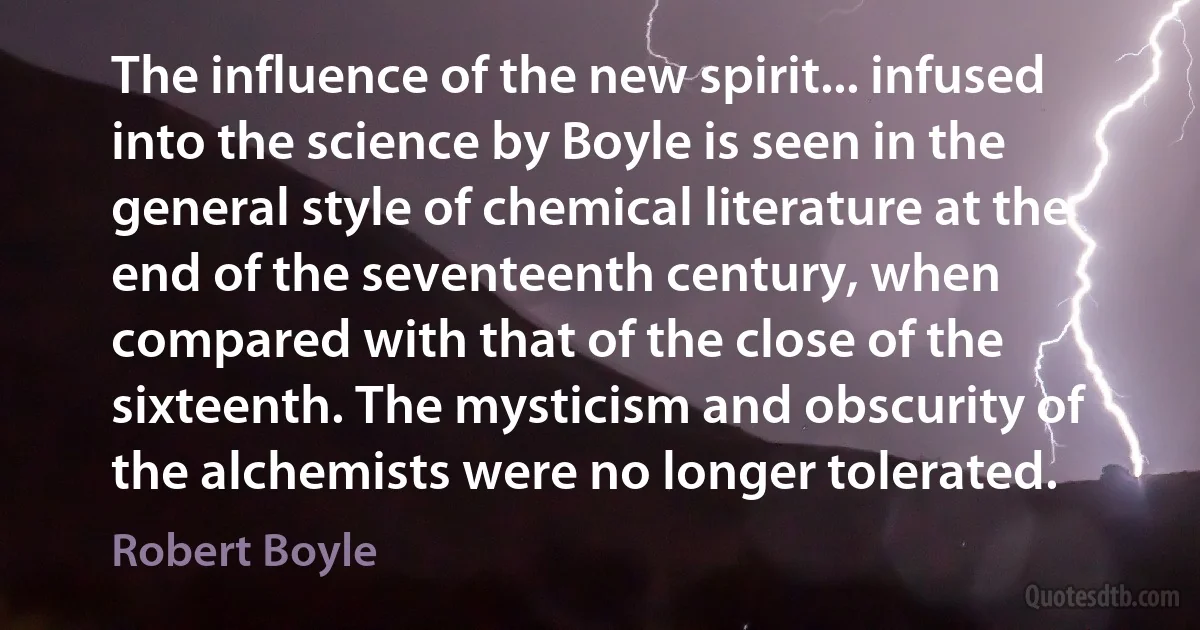Seventeenth Quotes - page 4
Few can contemplate without a sense of exhilaration the splendid achievements of practical energy and technical skill, which, from the latter part of the seventeenth century, were transforming the face of material civilization, and of which England was the daring, if not too scrupulous, pioneer.

E. F. Schumacher
Three years ago the Supreme Court of this nation rendered in simple, eloquent, and unequivocal language a decision which will long be stenciled on the mental sheets of succeeding generations. For all men of goodwill, this May seventeenth decision came as a joyous daybreak to end the long night of human captivity. It came as a great beacon light of hope to millions of disinherited people throughout the world who had dared only to dream of freedom.

Martin Luther King Jr.
The story of the brain's separation from the body begin with Rene Descartes. The most influential philosopher of the seventeenth century, Descartes divided being into two distinct substances: a holy soul and a mortal carcass. The soul was the source of reason, science, and everything nice. Our flesh, on the other hand, was "clock-like," just a machine that bleeds. With this schism, Descartes condemned the body to a life of subservience, a power plant for the brain's light bulbs.

Jonah Lehrer
Why did the problem of air become visible..? Why were Priestley, Boyle and Black able to see the question clearly enough..? ...because they had new tools. The air pump designed by Otto von Guericke and Boyle (...in collaboration with his assistant Robert Hooke...) were essential to Priestley's lab in Leeds. ...In a way, the air pump had enabled the entire field of pneumatic chemistry in the seventeenth century... [T]he air pump allowed you to... create a vacuum, which behaved markedly differently... even though air and the absence of air were visually indistinguishable.

Joseph Priestley
Spinoza is the anomaly. The fact that Spinoza, atheist and damned, does not end up behind bars or burned at the stake, like other revolutionary innovators of the sixteenth and seventeenth centuries, can only mean that his metaphysics effectively represents the pole of an antagonistic relationship of force that is already solidly established: The development of productive forces and relations of production in seventeenth-century Holland already comprehends the tendency toward an antagonistic future. Within this frame, then, Spinoza's materialist metaphysics is the potent anomaly of the century: not a vanquished or marginal anomaly but, rather, an anomaly of victorious materialism, of the ontology of a being that always moves forward and that by constituting itself poses the ideal possibility for revolutionizing the world.

Baruch Spinoza
[When Leibniz and Spinoza met in The Hague in 1676] The encounter between the two greatest philosophers of the seventeenth century in fact extended over several days. From a letter Leibniz posted to the Duke of Hanover's secretary from Holland, it is possible to infer that the courtier arrived in The Hague on or before November 18 and remained for at least three days and possibly as much as one week. Leibniz later told his Parisian friend Gallois that he had conversed with Spinoza "many times and at great length".

Baruch Spinoza
Neutrality toward Spinoza set in once one was able to admit that the "modern worldview," whose victory was decisively aided by Spinoza's metaphysics, does not, or does not entirely, coincide with this metaphysics. But even at this stage it was still generally maintained, and even emphasized, that among the three great Western philosophers of the seventeenth century - Descartes, Hobbes, and Spinoza - Spinoza was the most important one because, he was the most progressive one. He alone had drawn certain consequences from the foundations of modern philosophy, which became fully clarified only in the nineteenth century and which henceforth determined the general consciousness.

Baruch Spinoza
Cultures may be classed into three types: tool-using cultures, technocracies, and technopolies. ...until the seventeenth century, all cultures were tool-users. ...the main characteristic of all tool-using cultures is that their tools were largely invented to do two things: to solve specific and urgent problems of physical life, such as in the use of waterpower, windmills, and the heavy-wheeled plow; or to serve the symbolic world of art, politics, myth, ritual, and religion, as in the construction of castles and cathedrals and the development of the mechanical clock. In either case, tools (...were not intended to attack) the dignity and integrity of the culture into which they were introduced. With some exceptions, tools did not prevent people from believing in their traditions, in their God, in their politics, in their methods of education, or in the legitimacy of their social organization...

Neil Postman
Korean schoolchildren in North and South learn that Japan invaded their fiercely patriotic country in 1905, spent forty years trying to destroy its language and culture, and withdrew without having made any significant headway. This version of history is just as uncritically accepted by most foreigners who write about Korea. Yet the truth is more complex. For much of the country's long history its northern border was fluid and the national identities of literate Koreans and Chinese mutually indistinguishable. Believing their civilization to have been founded by a Chinese sage in China's image, educated Koreans subscribed to a Confucian worldview that posited their country in a position of permanent subservience to the Middle Kingdom. Even when Korea isolated itself from the mainland in the seventeenth century, it did so in the conviction that it was guarding Chinese tradition better than the Chinese themselves. For all their xenophobia, the Koreans were no nationalists.

Brian Reynolds Myers
For four hundred years the human race has not made a step but what has left its plain vestige behind. We enter now upon great centuries. The sixteenth century will be known as the age of painters, the seventeenth will be termed the age of writers, the eighteenth the age of philosophers, the nineteenth the age of apostles and prophets. To satisfy the nineteenth century, it is necessary to be the painter of the sixteenth, the writer of the seventeenth, the philosopher of the eighteenth; and it is also necessary, like Louis Blane, to have the innate and holy love of humanity which constitutes an apostolate, and opens up a prophetic vista into the future. In the twentieth century war will be dead, the scaffold will be dead, animosity will be dead, royalty will be dead, and dogmas will be dead; but Man will live. For all there will be but one country-that country the whole earth; for all there will be but one hope-that hope the whole heaven.

Victor Hugo
In seventeenth- and eighteenth-century France, race was already a weapon in the struggle between absolutism, aristocracy, and the middle class. The warfare spread to the arts and philosophy in the nineteenth century, by which time independent shoots in other cultures had also borne fruit, leaving the grand harvesting on a world-wide scale to our generation.
Viewed in the light of such facts, the race question appears a much bigger affair than a trumped-up excuse for local persecution. It becomes rather a mode of thought endemic in Western civilization. It defaces every type of mental activity - history, art, politics, science and social reform.

Jacques Barzun
Inevitably modern technology has polarized society. It has polluted the environment. It has disabled very simple native abilities and made people dependent on objects... Like an automobile which makes the world inaccessible, when actually in Latin "automobile" means "using your feet to get somewhere." The automobile makes it unthinkable. I was recently told, "You're a liar!" when I said to somebody I walked down the spine of the Andes. Every Spaniard in the sixteenth, seventeenth century did that. The idea that somebody could just walk! He can jog perhaps in the morning, but he can't walk anywhere! The world has become inaccessible because we drive there.

Ivan Illich
After Bruno's death, during the first half of the seventeenth century, Descartes seemed about to take the leadership of human thought... in promoting an evolution doctrine as regards the mechanical formation of the solar system... but his constant dread of persecution, both from Catholics and Protestants, led him steadily to veil his thoughts and even to suppress them. The execution of Bruno had occurred in his childhood, and in the midst of his career he had watched the Galileo struggle in all its stages. He had seen his own works condemned by university after university under the direction of theologians and placed upon the Roman Index. ...Since Roger Bacon, perhaps, no great thinker had been so completely abased and thwarted by theological oppression.

René Descartes


